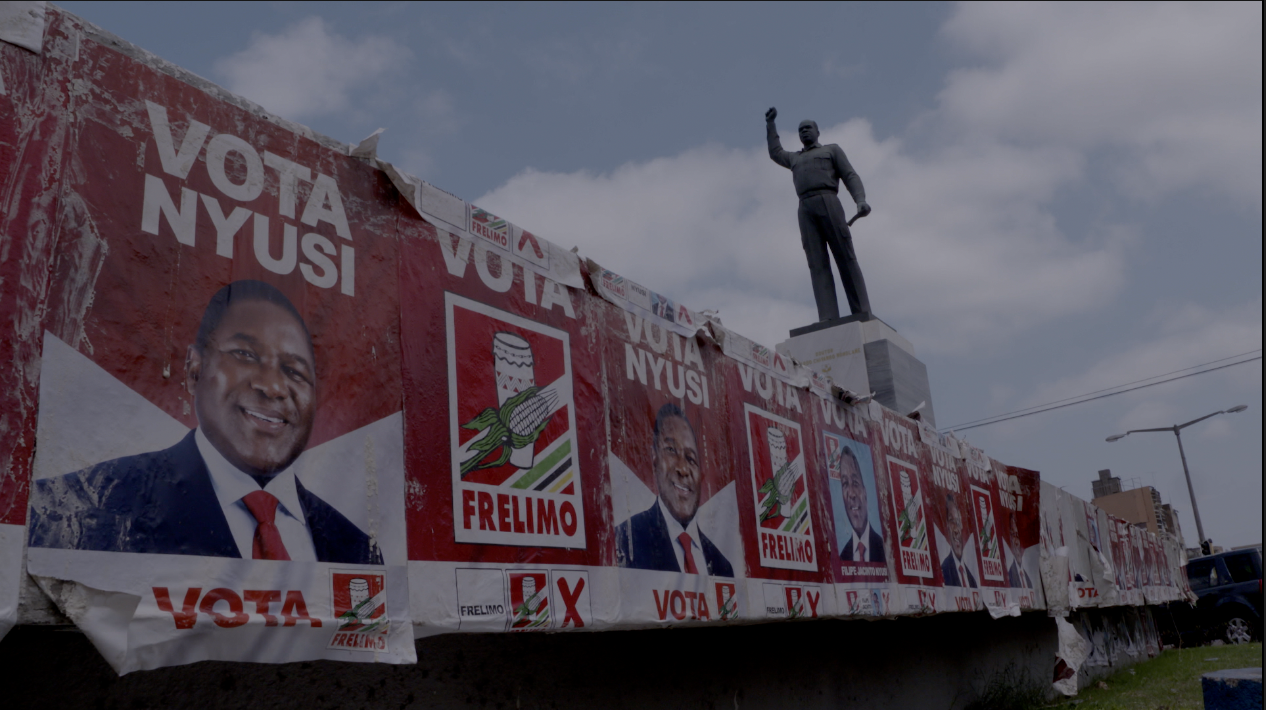
Fighting voter apathy: Mozambicans ready for general elections

“The youth are not interested in the vote because they are tired. There are many problems that they are facing but they don’t see change. They are disillusioned. Even those voting for the first time don’t believe there will be change.”
Andre Cardoso, who goes by the name MC Chamboco, is a 24-year-old rapper born and bred in Maputo, Mozambique’s capital. We meet him outside a small barber shop on the outskirts of Maputo, where he sits among friends. He is friendly and laughing with a quietly confident demeanour.
Cardoso has gained growing popularity among Mozambique’s social media platforms, for his politically charged, socially conscious rap music. He has recently released his first EP and has gathered particular momentum in the run-up to Mozambique’s presidential, provincial, and legislative elections on the 15th of October.
Power in music
In a political environment heavy with apathy, Cardoso has made it his mission to counter the popular mood and rally up engagement, particularly among his fellow youth. And a tool he has found notably powerful in this endeavor is music, most specifically rap.
“It’s time for the youth to wake up and go to the polling station to vote,” he raps (although it’s to be noted that this translation from Portugese into English has somewhat butchered his prose). “Vote with a conscience, don’t complain after the election without at least having tried.”
Cardoso falls effortlessly from polite conversation into rapping, spitting out lyrics in quick staccato beats and easy rhythm. He has been rapping for 11 years and the flow comes as naturally to him as his ability to engage in fierce political discussions.
“I use rap to spread the message to the government, but also as a platform of dialogue with youth,” Cardoso explains. “And to alert the youth about certain situations. My aim is this: To encourage the youth to reflect on problems and spread a message to the government that the youth deserve.”
Voter apathy
In Maputo, the walls are lined with political posters – primarily those of the incumbent Frelimo party – transforming parts of the city into bursts of the party’s signature red.
Yet Cardoso’s energies are not misguided. Despite the rallies and widespread political insignia, voter apathy is reportedly high and is expected to be accompanied by a low voter turnout in the upcoming elections. With youth making up around 33 percent of the 30 million population, according to the Mozambique National Statistical Institute INE, many of those not voting this coming Tuesday are young people.
“There is a perception that it is among the youth where the most voter apathy takes place,” explains Adriano Nuvungo, director of the Centre for Democracy and Development (CDD).
“This is problematic because most expectations around democratic change, can only take place if the youth are properly engaged. But they tend to stay away, and that speaks to the quality of governance in this country. Which is, on one hand, non-developmental, so it excludes the youth. And on the other hand, it is not inclusive, so it does not catalyse the youth participation in politics and governance.”
The elections come at a difficult time for Mozambique. Cities such as Beira were left devastated by two cyclones this year and there is a festering Islamist insurgency in the north. These factors, alongside heightened electoral violence and corruption allegations, are expected to play into this growing sense of resignation among potential voters.
While the Former Liberation Movement, Frelimo, has won all five previous elections over the main opposition party Renamo, international observers have previously reported cases of suspected fraud. This year there have also been suspicions of tampering with the electoral register, most notably in the case of Gaza province.
Earlier this week, Mozambique police officers were implicated in the killing of Anastacio Matavele, an election observer in Gaza province. In this context, Mozambique is witnessing an unprecedented level of violence during election time.
“This election is more violent than the previous ones. We have way more violence in this election. It is the first time that an election observer is murdered,” notes Nuvungo. “The rules of the game are abused by the system. Since democracy they have been systematically abused and by abusing the rules of the game, it affects the possibility of the election really representing the will of the people.”
Fighting for change
Yet in an election marred by violence and growing apathy, there are many who refuse to give up.
“Mozambique’s election is really the way for people to keep the struggle. The struggle to protect the small democratic space that they have. They use it as much as they can, to ensure there are checks and balances, also as a way of protecting some space for democracy,” explains Nuvungo.
And for Cardoso, the spirit of the struggle remains, alongside a hope that he can promote change through music.
“The youth have energy to change society. And this change does not have to be violent. From speech, we can do this.”






